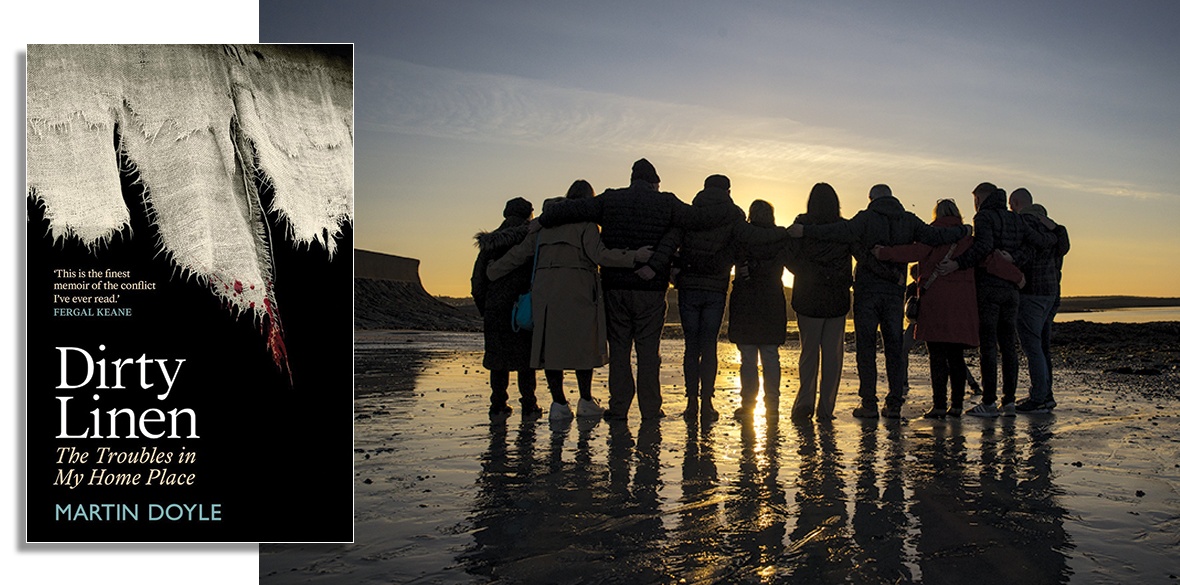This is the last article you can read this month
You can read more article this month
You can read more articles this month
Sorry your limit is up for this month
Reset on:
Please help support the Morning Star by subscribing here
Dirty Linen: The Troubles in My Home Place
By Martin Doyle, Merrion Press, £22.99
IN Dirty Linen, author Martin Doyle returns to his home to examine the Troubles through the lives of his neighbours and those who were caught up in violence.
The book is part personal memoir and part chronicle of Northern Ireland’s most atrocious period of sectarian and political violence, the 1970s. By focusing on the local, giving attention to voices of ordinary working-class citizens, both Catholic and Protestant, Doyle creates the space for a deeply layered account of the pain of sectarian war.
The book’s title evokes the linen manufacturing heritage of a small locality in Northern Ireland, the parish of Tullylish, on the River Bann. This is the “microcosm of a single rural parish” chosen as a means of narrowing focus “to the lives lost in a few square miles” during the Troubles.
Tullylish is within the infamous “murder triangle” of Counties Armagh and Tyrone; the stomping ground of the Glenanne Gang. This was a secret network of loyalist paramilitaries, which included RUC officers and UDR soldiers, who massacred civilians, setting off in retaliatory barbarity to the IRA.
The effect of using a specific place in the telling of stories of atrocity is to root extraordinary experiences in ordinary reality. A field, a meandering laneway, a country post office or pub, a ramshackle darts club next to a pigeon club — these are the sites that chime with my own memories of childhood in 1970s Dublin, brought to us then in nightly news bulletins as places cordoned off by police tape, riddled with bullets and blown to bits.
Seeping through this skilful testimony of carnage is a story of how place absorbs history, already there in the many village and town names that mix Irish and English, in fields still holding evidence of flax production, and in rivers, bogs and loughs whose Jacobean history the residents mention as though it were last week.
As books editor of The Irish Times, Martin Doyle has an eye for the small detail that tells the greater truth. His previous experience was working for Irish community newspapers in 1990s London. He is drawn to Northern Ireland’s local newspapers from the Troubles period. These provide source material closer to the communities affected, taking the reader back to the reality of immense violations in the fabric of ordinary lives. Focusing on the local can also reveal embedded assumptions underlying bigotries.
Doyle talks to everyone, from every side of the divide, civilians and soldiers, factory workers and farmers, police and TA volunteers. It’s a real achievement to gather together such testimonies of unimaginable pain, giving a fair-minded, balanced account, absorbing bitterness and the struggles to survive such losses.
Philosopher, Hannah Arendt wrote of “the banality of evil” in relation to the non-reflective, non-thinking actions of organised murderers. In Dirty Linen, Doyle’s close engagement with the day-to-day lives of victims, his naming of family members, anecdotes of family rituals and mundane events makes vivid the inhumanity of these crimes.
It is hard to go back but essential not to forget. After shopping for a wedding dress, Jennifer McNern was having coffee with her sister, Rosaleen, in the Abercorn Restaurant in 1972 when an IRA bomb blew her legs off. Rosaleen also lost her legs and an arm. Two other young women (Ann Owens ,22, and Janet Bereen, 21) were killed in the explosion.
McNern’s body paid the price of sectarian hatred. She tells Doyle of her concerns that a new generation is naive about the realities of the Troubles, and that there is nostalgia for the excitement of street violence: “They’ve no idea and some of them are ready to roll.”
Dirty Linen lifts the lid on the emotional repression that was a means of handling the unrelenting vehemence of the hatred unleashed.
The UVF murders of members of The Miami Showband recounted here took me back. As teenagers my friends and I often babysat for Miami bandmember, Brian McCoy and his wife, Helen, then living on our suburban estate in north Dublin. I remember the intense crush we had on Brian who was gorgeous.
As I try to conceive of the terror that night — when the band’s minibus was flagged down in the pitch dark, band members ordered off and lined up, when the bomb being planted in their van exploded prematurely and they were then hunted and shot — my mind resists.
What I can better sense is the deadly emptiness hanging in the McCoy house long after media interest had moved on. This is the legacy carried by survivors which Dirty Linen brings to the fore “like the sinister snow of scutched flax,” as Doyle quotes from a poem by Maureen Boyle.
The peace process towards the Good Friday Agreement winds its threads through the book. Consensus for change to a new paradigm for living together is acclaimed by the survivors. The danger of tipping backwards, prompted by Brexit and by the boycotting manoeuvres of the DUP, makes this book essential reading.
Within the context of proven collusion between the Northern Ireland security forces and paramilitaries, comes the British government’s highly controversial Troubles Act.
The Act aims to limit investigation and criminal proceedings once passed. It is a reminder that outrage at the policy of “delay, deny, and then death,” as experienced by victims seeking legacy investigations, is alive and kicking.









